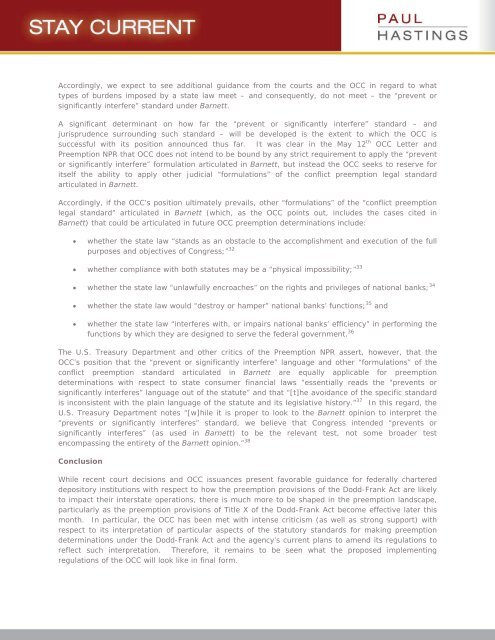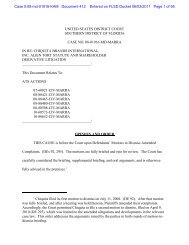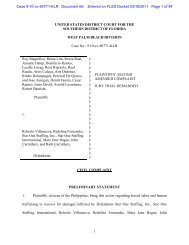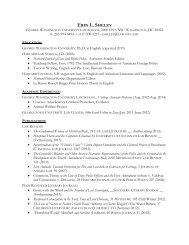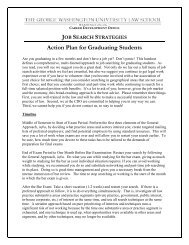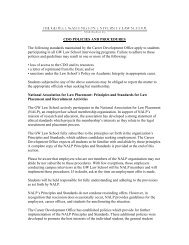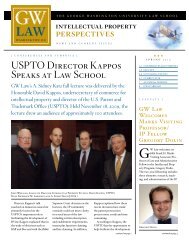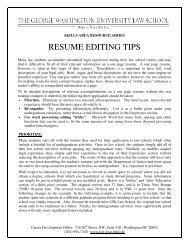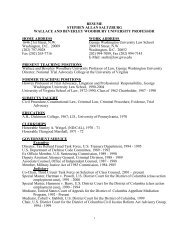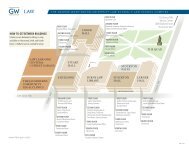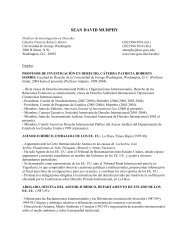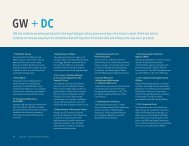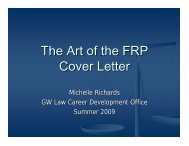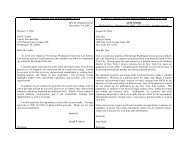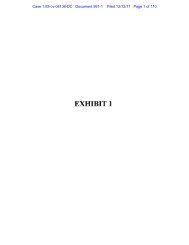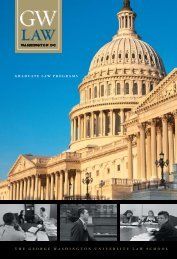CLE Materials for Panel #1 - George Washington University Law ...
CLE Materials for Panel #1 - George Washington University Law ...
CLE Materials for Panel #1 - George Washington University Law ...
Create successful ePaper yourself
Turn your PDF publications into a flip-book with our unique Google optimized e-Paper software.
Accordingly, we expect to see additional guidance from the courts and the OCC in regard to what<br />
types of burdens imposed by a state law meet – and consequently, do not meet – the “prevent or<br />
significantly interfere” standard under Barnett.<br />
A significant determinant on how far the “prevent or significantly interfere” standard – and<br />
jurisprudence surrounding such standard – will be developed is the extent to which the OCC is<br />
successful with its position announced thus far. It was clear in the May 12 th OCC Letter and<br />
Preemption NPR that OCC does not intend to be bound by any strict requirement to apply the “prevent<br />
or significantly interfere” <strong>for</strong>mulation articulated in Barnett, but instead the OCC seeks to reserve <strong>for</strong><br />
itself the ability to apply other judicial “<strong>for</strong>mulations” of the conflict preemption legal standard<br />
articulated in Barnett.<br />
Accordingly, if the OCC’s position ultimately prevails, other “<strong>for</strong>mulations” of the “conflict preemption<br />
legal standard” articulated in Barnett (which, as the OCC points out, includes the cases cited in<br />
Barnett) that could be articulated in future OCC preemption determinations include:<br />
<br />
whether the state law “stands as an obstacle to the accomplishment and execution of the full<br />
purposes and objectives of Congress;” 32<br />
whether compliance with both statutes may be a “physical impossibility;” 33<br />
whether the state law “unlawfully encroaches” on the rights and privileges of national banks; 34<br />
<br />
<br />
whether the state law would “destroy or hamper” national banks’ functions; 35 and<br />
whether the state law “interferes with, or impairs national banks’ efficiency” in per<strong>for</strong>ming the<br />
functions by which they are designed to serve the federal government. 36<br />
The U.S. Treasury Department and other critics of the Preemption NPR assert, however, that the<br />
OCC’s position that the “prevent or significantly interfere” language and other “<strong>for</strong>mulations” of the<br />
conflict preemption standard articulated in Barnett are equally applicable <strong>for</strong> preemption<br />
determinations with respect to state consumer financial laws “essentially reads the “prevents or<br />
significantly interferes” language out of the statute” and that “[t]he avoidance of the specific standard<br />
is inconsistent with the plain language of the statute and its legislative history.” 37 In this regard, the<br />
U.S. Treasury Department notes “[w]hile it is proper to look to the Barnett opinion to interpret the<br />
“prevents or significantly interferes” standard, we believe that Congress intended “prevents or<br />
significantly interferes” (as used in Barnett) to be the relevant test, not some broader test<br />
encompassing the entirety of the Barnett opinion.” 38<br />
Conclusion<br />
While recent court decisions and OCC issuances present favorable guidance <strong>for</strong> federally chartered<br />
depository institutions with respect to how the preemption provisions of the Dodd-Frank Act are likely<br />
to impact their interstate operations, there is much more to be shaped in the preemption landscape,<br />
particularly as the preemption provisions of Title X of the Dodd-Frank Act become effective later this<br />
month. In particular, the OCC has been met with intense criticism (as well as strong support) with<br />
respect to its interpretation of particular aspects of the statutory standards <strong>for</strong> making preemption<br />
determinations under the Dodd-Frank Act and the agency’s current plans to amend its regulations to<br />
reflect such interpretation. There<strong>for</strong>e, it remains to be seen what the proposed implementing<br />
regulations of the OCC will look like in final <strong>for</strong>m.<br />
6<br />
6


